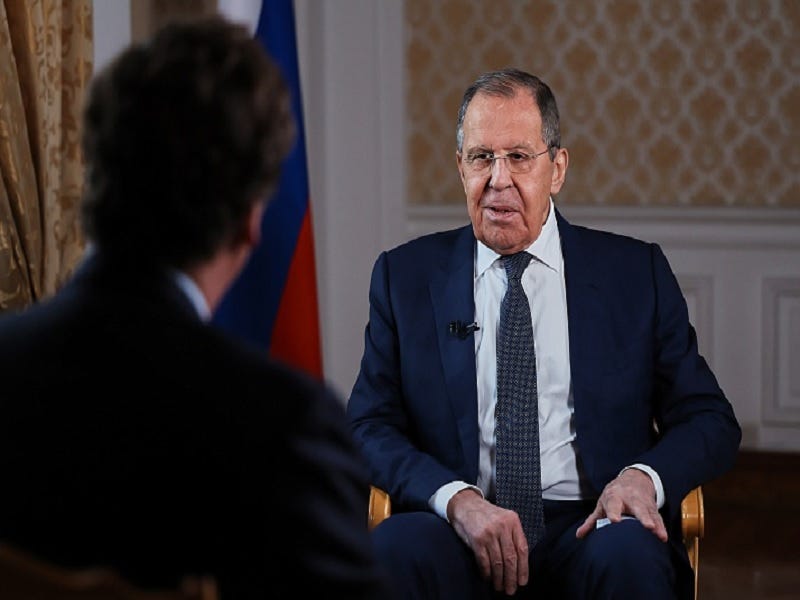If Putin hopes to reach a deal with Erdogan on Syria, then it’ll require keeping up the pretense (however unbelievable it is to objective observers) that Turkiye no longer backs terrorists, thus accounting for Lavrov’s diplomatic assessment of events there.
Lavrov’s interview with Tucker mostly saw him elaborate on Russia’s stance towards the proxy war with NATO in Ukraine, which built upon what he shared during his earlier and more concise interview with Newsweek in early October that was analyzed here at the time. He was also importantly asked about the latest events in Syria, the assessment of which hasn’t received much international media attention, at least not yet. The present piece will therefore review and interpret what he said about that.
He began by describing the Astana process between his country, Iran, and Turkiye as being driven by the need to contain US-backed Kurdish separatist threats in Syria before expressing hope that he’ll meet with his counterparts over the weekend during the Doha Forum to discuss the latest developments. Lavrov then said he’d also like to “discuss the need to come back to strict implementation of the deals on Idlib area, because Idlib de-escalation zone was the place from where the terrorists moved to take Aleppo.”
According to him, Turkiye must continue separating Hayat Tahrir al-Sham (HTS) from the non-terrorist opposition, and he also wants the M5 highway between Damascus and Aleppo reopened after that group just captured its northern half over the past week. When asked by Tucker about who’s backing HTS, he interestingly didn’t mention Turkiye but instead speculated that it could be the US and the UK. Lavrov also remarked that there’s speculation about how Israel could benefit from the latest tumult too.
Interpreting his assessment, the first point that stands out is his insistence on returning to the agreements that were reached throughout the course of the Astana process. This chiefly concerns jointly containing US-backed Kurdish separatist threats, strictly implementing the Idlib de-escalation deal that also calls for separating HTS from the non-terrorist opposition, and reopening the M5 highway. All three are Turkiye’s prerogative, which could explain why he declined to accuse it of backing HTS.
After all, if Putin hopes to reach a deal with Erdogan on Syria, then it’ll require keeping up the pretense (however unbelievable it is to objective observers) that Turkiye no longer backs terrorists. This could take the form of the one that was proposed here with regard to radically decentralizing the country as an alternative to HTS marching into Damascus to carry out regime change against Assad like founder Jolani told CNN that he wants to do. Russia wants to avoid what might soon be a Libyan-like scenario in Syria.
To that end, it’s willing to cut deals with the proverbial devil so as to reduce the chances that this country turns into a black hole of regional chaos and instability, which could lead to ISIS’ revival. If everything once more spirals out of control, then radical Russian and former Soviet nationals might travel there yet again for terrorist training, which is what prompted Russia’s intervention in Syria in 2015. It could no longer fight against them as effectively as before though since it’s now prioritizing the special operation.
It's therefore imperative that this be prevented from happening, thus accounting for Lavrov’s diplomatic assessment of the latest events in Syria. Russia is keenly aware of its current military limitations in this theater and the possibility of overstretching its Aerospace Forces by suddenly redirecting them away to Syria from Ukraine precisely at the moment when it must achieve a breakthrough before Trump returns to office. That’s why Russia appears to be going all in on a political solution instead of a military one.





You only need the book "The Only World Power: America’s Strategy of Domination is the German title of a geopolitical treatise by Zbigniew Brzezińskis." The conflict zones of Ukraine and Syria could rapidly close to one if you look at the map.
Armenia turns to the US, Azerbaijan is dominated by Turkey, Iraq is destabilized by the US, Iran is targeted by Israel, Lebanon is more or less in chaos and Syria is bombarded with impunity by the US and Israel. Let’s not forget Georgia, it remains to be seen how this develops. The target clearly seems to keep the southern flank of Russia in turmoil. It will be time to create the China and Russia unrest on the southern flank of the USA, as they say so nicely to beat the opponent with his own weapons. If you sit on the banks of the river long enough, you can see your enemy’s corpse passing by. Chinese proverb - will probably not help anymore and just reacting to the actions of the West also leads to nothing. How about an Oreschnik missile in Syria, in areas of the HTS or Kurds who conquer territories for the USA. You could claim similar to the USA in bombing the Chinese embassy in 1999 in Yugoslavia, sorry we did not want to hit your base that was an accident.
"If Putin hopes to reach a deal with Erdogan on Syria..."
'Ищи la Turk...' as they used to say in the Tsars' courts.
"...could be the US and the UK...."
History repeats itself: https://en.wikipedia.org/wiki/Crimean_War
"...Israel could benefit from the latest tumult too."
The old Eastern Question on 20th-century steroids: https://en.wikipedia.org/wiki/Eastern_question